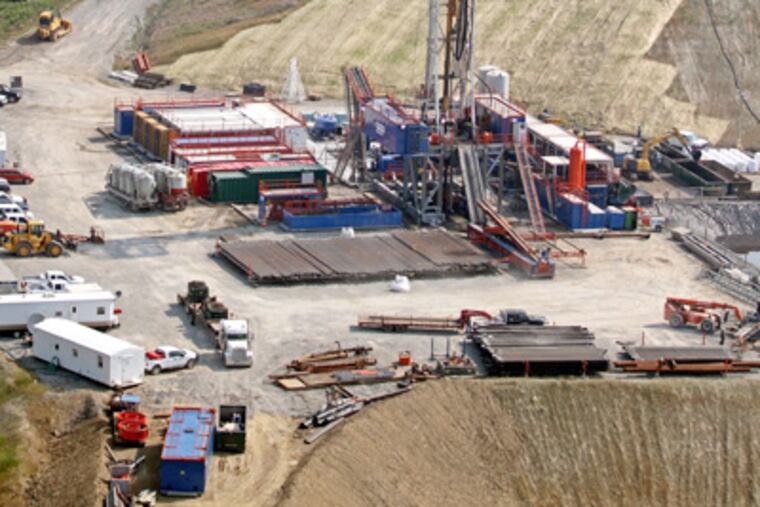Debating economic impact of Marcellus Shale in Pa.
Since the Marcellus Shale boom began in 2008, there has been much debate and disagreement over the effect natural gas development would have on Pennsylvania's economy.

Since the Marcellus Shale boom began in 2008, there has been much debate and disagreement over the effect natural gas development would have on Pennsylvania's economy.
Gov. Corbett, who found himself in the hot seat last week over his comments on the state's lagging employment rate, has promoted Pennsylvania as a rival to Texas as a regional energy hub. In his budget address this year, he talked about the energy sector creating "hundreds of thousands of new jobs."
Most economists credit the Marcellus Shale development with creating jobs and having a profound economic effect in the rural areas where drilling is taking place. But they say energy development can have only a modest effect in an economy as diverse as Pennsylvania's.
"Gas development has not been as big as we thought and is not the size that it will cure all the state's employment problems," said David Passmore, director of the Penn State Institute for Research in Training and Development.
Even if shale-gas development has created 245,000 direct and indirect jobs - the number used by the Pennsylvania Department of Labor and Industry, and touted by industry trade groups - that still amounts to only 4 percent of total employment in a state with 5.7 million jobs.
Mark Price, a labor economist with the liberal-leaning Keystone Research Center, says he can find only 20,000 direct jobs created from Marcellus Shale. Even if all coal-mining and legacy natural gas drilling is added together, "this is a sector that still only makes up half of 1 percent of Pennsylvania's economy," he said.
Industry supporters say Price's narrow focus does not account for indirect employment caused by drilling - jobs created by suppliers, or from spending by those employed in the business. Nor does it account for new wealth flowing to owners of mineral rights, who collect royalties on natural gas extracted from their property.
"While some may wrongly consider a quarter of a million private sector jobs 'hype,' our industry is very proud of the positive economic impact that our work, and its broad-based supply chain, is having across the entire commonwealth, especially at the refineries in Southeastern Pennsylvania," said Patrick Creighton, a spokesman for the Marcellus Shale Coalition, the industry trade group.
"The gas boom is real," said John Hanger, former secretary of environmental protection and a Democratic candidate for governor. But he says Corbett overestimates the economic effects.
Much of the early enthusiasm for shale gas was generated by a 2009 Penn State report on the "emerging giant" by the Department of Energy and Mineral Engineering. The report came under fire for not disclosing that it was funded by industry groups and for its overt appeal to refrain from overregulating and taxing the industry.
The industry-sponsored report's early estimates "were probably a little overheated," Passmore said.
Timothy Kelsey, a Penn State agricultural economist who did not participate in the engineering department study, came back with a report in 2011 that pegged the economic effects more modestly. His work estimated that shale gas created more like 100,000 direct and indirect jobs.
"It has a very positive effect on small areas where drilling is taking place, but not that large of an impact statewide," said Kelsey. "That's not saying it's negative. It's that the size of the state's economy is so large."
He said the early studies assumed owners of natural gas leases would immediately spend most of their windfall in Pennsylvania, when anecdotal evidence suggests much of it got socked away in savings or investments.
"The lease and royalty income that does stay is significant, and you don't need a lot to have a positive impact on an area with a small population," he said.
Industry studies assumed drilling companies would spend far more on local suppliers than they actually do - much of the equipment and supplies is imported from other states.
Natural gas prices also plummeted to levels not forecast in 2009, which means royalty payments have come in lower than anticipated.
"There clearly was overexuberance in some of those early studies," said Kelsey.
Other economic impacts are "kind of diffuse" and more difficult to ascribe to the Marcellus. For instance, the low price of natural gas has driven down energy costs for every household that uses gas or electricity, which is produced from gas. But Kelsey notes the entire nation is benefiting from cheap energy prices, not just Pennsylvania.
Kelsey said the actual statistics on Marcellus economic impact are "a little mixed," which allows advocates on both sides of the polarized drilling debate to cherry-pick data to support their point of view.